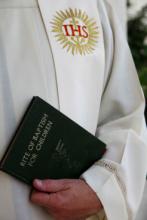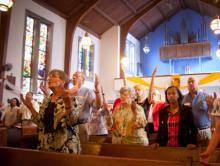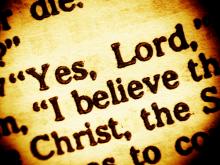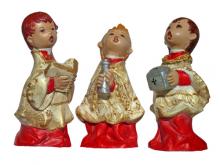Liturgy

Editor's Note: Last week, Sojourners’ Associate Web Editor Catherine Woodiwiss caught up with musical collective Gungor at South by Southwest in Austin, Texas. Here’s what Michael Gungor has to say about art, liturgy, and the future of music.
This interview has been edited for length and content.
Catherine: So what brings you to South by Southwest (SXSW)?
Gungor: I guess we thought it was about time to experience the circus.
Catherine: A couple of years ago there was talk of SXSW becoming a destination for "Christian techies,” and Donald Miller premiered his popular film, Blue Like Jazz, at the film portion of the festival. Do you consider yourself part of a Christian “witness” here at SXSW?
Gungor: We are here to make some music, have a good time, and perhaps make some friends along the way. We certainly aren't here to proselytize or advance some secret religious message or anything.
But anywhere we go, we do have a desire to live the sort of life that Jesus invited people to live.

It was a busy weekend on the eve of Lent for fans of spirited singer and spiritually-minded musician Michael Gungor. If you were not on the Gungor or Michael Gungor Twitter feed over the first two days of March, you might have missed the news about a new band, a new record, and a new mini-tour.
As the band called Gungor takes a short break from touring in support of its sonically and lyrically adventurous album I Am Mountain, the family business has reinvented itself with the proverbial “side project” so common with musical visionaries who cannot contain their creative output to just one brand name or band name.
But The Liturgists — a collective that includes Michael’s wife Lisa, brother David, and a host of other supporting musicians and collaborators — are not just another band, and the brand is “the work of the people.” The band’s Vapor EP is a warm and experimental worship text that includes a song, a spoken-word invocation and incantation, and a guided centering prayer meditation. On the group’s Ash Wednesday-week mini-tour, all the shows are free by RSVP and are not really shows as at all — not as indie-consumers even in the contemporary Christian scene have come to expect.
MOST MEDIA ACCOUNTS of Nadia Bolz-Weber focus on her tattoos. She has the liturgical year tattooed on one arm, from creation to Pentecost; another features Lazarus still wrapped, but very much alive. She got that one while struggling to write a sermon on Jesus’ raised friend.
The tattoos on a 6’1” woman with a taste for punk, a bad-girl past, and a gay-inclusive church—House for All Sinners and Saints in Denver—make for easy picking for secular media. You may have caught Bolz-Weber’s book Pastrix on the New York Times bestseller list. Wise, self-aware, hipster Christian celebrities have a market for books, and she’s tapped it.
In contrast to much of the superficial media coverage, what’s most interesting about Bolz-Weber is her deep traditionalism. “Secular media doesn’t understand the difference between orthodox and conservative,” she tells me through a toothy smile, blue-green eyes blazing over thick-rimmed ’50s-era glasses.
“House,” as the community calls itself, is almost medieval in its liturgy. There are no instruments, just a cappella chant and pillows for kneelers at a prayer station. The Eucharist is served weekly. Eastern Orthodox iconography drapes the church’s interior, stoles, website, and literature. Latin hymns fill the communion liturgy on the Sunday evening I attend. Bolz-Weber is proud to be using Franz Schubert’s setting for the Mass.
This is not high church fussiness; it is liturgical and churchly orthodoxy for scruffy hipsters. Bolz-Weber explains that many of her fellow social progressives want to jettison the Bible and Jesus in order to be more inclusive. “But why should we jettison the only things we have going for us?” she asks.
Nadia Bolz-Weber's church, House for All Sinners and Saints, is not your typical Lutheran church.
IN HER LATEST book, Sara Miles—author of the spiritual memoirs Take This Bread and Jesus Freak—goes where traditional and liturgical churches don’t regularly go: into the streets to push the boundaries of public worship. City of God chronicles a day in the life in San Francisco’s Mission District, on one Ash Wednesday when Miles and others from St. Gregory of Nyssa Episcopal Church offer “Ashes to Go,” a growing national movement within the Episcopal Church to perform the imposition of ashes outside the church walls on the first day of Lent.
Ash Wednesday works on the street because it has a broad ability to speak to people with “different beliefs about God and very different relationships to the church.” Even so, carrying the observance away from the altar has generated critics. Some liturgists have wondered if, without a proper church context, “the ashes become a meaningless affirmation of our earthly life,” or whether regular folks on the street can really appreciate the profundity of the human condition and mortality without the church to explain it to them. Trusting that people on the street will “get it,” Miles embarked on a day of crossing the traditional borders of worship space to smudge foreheads in McDonald’s, taquerias, hair salons, and botanicas.
Miles finds that traditional observance of liturgies such as Ash Wednesday helps reclaim the public language of sin and repentance in a progressive way. This kind of re-evaluation of sin in common life led her to realize how she’s also fallen short of the call to solidarity and deep communion with the city. “I aspired to be the kind of neighbor who knew everyone,” she writes, “I yearned to be in real relationship.” But her admittedly self-satisfied sense of fellowship didn’t match up to her interactions. She hadn’t even bothered to learn the last name of a young Latino activist on her block and confesses, “I prayed for my neighbors, but not so much with them, and it made me uncomfortable.”

The Church of England has been accused of “dumbing down” the baptism service following the introduction of an alternative liturgy in which parents and godparents need not repent of their “sins” or reject “the devil.”
In the traditional version of the service, parents and godparents are asked: “Do you reject the devil and all rebellion against God?” and “Do you repent of the sins that separate us from God and neighbor?”
In the alternative version, now being tested in 400 churches, parents are instead asked to “reject evil and all its many forms and all its empty promises.”

THE CELEBRATED PHILOSOPHER Ludwig Wittgenstein used to speak—disapprovingly—of “language going on holiday.” For example, sportswriters often free language from the drudgery of everyday common usage to let it spread its wings in glorious hyperbole about their favorite teams.
Our biblical heritage gives us examples that are much deeper. When we read the prophets especially, we hear language liberated from the constraints of the everyday to give it a sacred vacation, a true “holy-day,” so that it can return to us reinvigorated. We hear them sending language on an adventure holiday into the realm of God’s future. When they receive the words back, the prophets find themselves recounting visions of a new world that God has in store.
Eschatological language that has been to the future and back exerts a powerful authority over us. In this month’s scriptures we experience that authority again in Isaiah’s unforgettable oracles about the holy mountain on which no one shall ever again hurt or destroy. We shall see, with our mind’s eye, the rising of the sun of righteousness with healing in its wings. We shall hear Jesus speaking of the life waiting for the children of the resurrection. The church’s year ends by inviting us to enter under the authority of the coming kingdom, to become fluent in its strange language of hope, harmony, and ultimate reunion with the Holy One who has reconciled all creation through the cross and resurrection.

With six children in a Southern Baptist family in the 1970s, we could easily have had a dozen Bibles in the house. There was the giant, gray Family Bible with the embossed cover that resided on the bottom shelf of the living room, which nobody ever read. And there was a scattering of those palm-sized New Testament and Psalms around the place, like silverfish in a drawer — always white or pale green, with ersatz gold leafing that would flake off under the prodding of a fingernail.
There was a Novum Testamentum from when my oldest sister took Latin in college, sandwiched on a shelf. I also always liked the ones from the Gideons (do the Gideons even still exist?) that had translations of John 3:16 in the back. My favorite: Sinhalese.
The vast majority, though, were what could be termed “presentation Bibles.” Invariably from Broadman Press (headquartered in Nashville, the Baptist Vatican), either slick shoe-polish black or steak-slab red “bonded leather” (Ooh, baby!), these had been awarded as part of Sunday school or Scripture memorization schemes, and always had about them the whiff of bribery, with the name of the person to whom the Bible was “dedicated” written in ostentatious cursive in the front. “The Words of Christ Are in Red,” it was noted, and in the back was a sheaf of biblical maps, the topography of the Exodus, and Paul’s missionary journeys rendered in Sweet Tart pink and blue.

Nothing upsets the folks in the pews as much as changing the liturgy that they’re accustomed to, and that seemed likely to be the case when the Vatican ordered revisions to the familiar prayers and rubrics of the Catholic Mass.
But now, more than a year after the changes took effect in U.S. parishes, a survey of American priests shows that they are more disturbed by the innovations than their flocks.
In fact, the poll, conducted by researchers at St. John’s University School of Theology-Seminary in Collegeville, Minn., showed that almost 60 percent of priests surveyed did not like the new Roman Missal, as the liturgical book for the Mass is known, while about 40 percent approve.

HOUSTON — Sunday mornings at Houston Oasis may look and feel of a church, but there’s no cross, Bible, hymnal, or stained glass depictions of Jesus. There’s also nary a trace of doctrine, dogma, or theology.
But the 80 or so attendees at this new weekly gathering for nonbelievers come for many of the same reasons that others pack churches in this heavily Christian corner of the Bible Belt — a sense of community and an uplifting message that will help them tackle the challenges of the coming week, and, maybe, the rest of their lives.
“Just because you don’t believe in God does not mean you do not need to get together in community and draw strength from that,” said Mike Aus, a onetime Lutheran pastor who is now an atheist and founder of Houston Oasis.
“We are open to any message about life as long as no dogmatic claims are made.”

AFTER SEVEN YEARS of theological, historical, and pastoral conversation, leaders of Reformed and Catholic churches in the U.S. this January signed a carefully worded, one-page agreement to mutually recognize the sacrament of baptism as it is practiced in each other's churches. This agreement represents dedicated—and inspiring—ecumenical work.
The agreement was signed by representatives of the Christian Reformed Church in North America, the Presbyterian Church (USA), the Reformed Church in America, the Roman Catholic Church, and the United Church of Christ. This agreement is not unprecedented, coming as it does nearly five decades since Vatican II's decree on ecumenism, in which the Catholic Church recognized non-Catholic baptism whenever "duly administered as Our Lord instituted it, and ... received with the right dispositions." However, for each tradition, baptism gives sacramental expression to that tradition's understanding of the church and what it means to be a member. For these churches to recognize each other's baptismal rites gives visible witness to their mutual desire for unity among the members of Christ's body.
This desire for unity between the churches is not an add-on to the gospel; it is not something we do if we happen to get to it. It is central to the saving work and mission of Jesus.
This January's agreement is spare in its requirements. It states that the use of water and a reference to the Trinity (Father, Son, and Holy Spirit) are all that are needed for mutual recognition. By specifying these two simple elements, the ecumenical team made a decision to respect the liturgical tradition of each church. The unique way that components of the rite have developed in each church—how catechesis is done, the use of scripture, the use of sponsors, anointing, and other elements—do not need to be changed.

I am part of a liturgically worshiping tradition. There are days I wish I wasn’t; days when our Kyrie is lacking splendor and our Eleison feels redundant; moments that I wish we could get to the important stuff — my inspired and infallible message (I kid) — and toss the unending Psalm or Prayers of the Church.
And then there are the other times, when I am guiltily reminded that cutting the creed means missing out on the same words spoken by millions of believers before me. Or when the music just all works and my heart is stirred by the Hallelu– (shhh, its Lent) Chorus.
So I like to remind my community of believers from time to time why we do what we do. I have long felt the risk of liturgy is that it becomes rote narration, a thoughtless speechifying of sorts. So that this might be avoided, here are my thoughts on the creeds and why a corporate confession of faith is still valuable today.

IF YOU ARE not overly familiar with the repertoire of a Leonard Cohen concert, it's hard to tell the new songs from the old. Songs from a different age sound neither anachronistic nor nostalgic, while the new echo as though they have been around forever. It's the same show night after night, with songs from the latest album, Old Ideas (released in 2012), woven into the familiar canon. Cohen tells audiences that his revivalist tour might end in two years, so that he can start smoking again by the time he turns 80.
It is a joke you know Cohen has cracked a hundred times, the kind that makes my brother call him the Jewish Dean Martin. The humor is one part of a precise choreography, whose arrangements shift from blues to waltzes to New Orleans jazz, Celtic, gospel, country, and disco, all set in the mode of Hebrew Minor and conspiring to create a vivid world that does not exist, except in paradox. Honey is the texture that comes to mind. Viscous and turbid, neither solid nor liquid. Sensual relief from the coarse, metallic world. And sweet. Sweet in the meaning of the verse from the Persian song "Navaee"—"High sweet melody, and sadness of love, dwelling in the bottom of the heart, where nobody sees"—the mixing of sorrow and transcendence into sublime paradox.
He is and has been many things to his devotees: poet, singer, writer, band leader, lover, satirist, artist, and novelist. But one thing Leonard Cohen is not is a preacher.
Prostrating and posing on bended knee, eyes knit tight, hat pulled low—he could say anything he pleases, from treatises to treason, and people would listen. Given a room and a crowd, the born preachers cannot tame the urge to climb atop the pulpit. This political instinct to prophesy and govern is noted but subdued in the opening song of Old Ideas, called "Going Home," the cry of an old man liberated from burdens of desire for love and for mission: "He will speak these words of wisdom / like a sage, a man of vision / though he knows he's really nothing / but the brief elaboration of a tube ... a lazy bastard living in a suit."

Should the market have so much control over liturgical music?
There is nothing new to this question. Not at all. Now, however, there may be much that is new in discoverng the answer.
Once upon a time in the European West, liturgical music was created by musicians who were supported by the patronage of a noble class.* Byrd, Tallis, you know the gang.
Before then it was the monastic composer (Hildegard, et al) who seemed to rule the charts with their chant. Musicians were supported by the Church and the Wealthy in some way and thus created music for worship.
The old markets, of course, have given way to new markets over the centuries, but throughout the history of the Western marketplace, markets (and the people they represent) have had tremendous say in what music we deem as sacred.
Now, in our post-colonial, neoliberal marketplace, how shall we choose liturgical music?
IN THE 17TH century, Thomas Brooks published the devotional Precious Remedies Against Satan’s Devices, which he hoped would serve as a “salve for sores” and a “remedy against malady,” to provide those who face hardship with nourishment, support, and cheer to continue God’s work in themselves and the world.
It’s no coincidence that The Welcome Wagon borrows Brooks’ title for its second LP. In unsettling economic and political climates, the married gospel-folk duo of Vito and Monique Aiuto write songs that offer a balm of spiritual medicine to heal their congregation and wider audience.
Before the Aiutos gained a musical presence, Vito worked at a Presbyterian church in Manhattan and was a minister to students at New York University. Six years ago he helped found Resurrection Presbyterian Church (PCA) in Brooklyn, where he and Monique continue to serve a young, diverse congregation.
In their ministry at Resurrection, they released their first album in 2008 (Welcome to The Welcome Wagon); close friend and indie music icon Sufjan Stevens helped record and produce it. The album was met with high acclaim and sounded like a natural extension of Stevens’ own catalogue. With a popular musical ally and an overtly spiritual foundation, The Welcome Wagon yielded an unlikely coupling: the hip and the religious.
In a New York Times article titled “A Congregation in Skinny Jeans,” Vito confronts this, saying that while he may fit the “cool” bill, it’s an unhelpful way to describe a church community. Despite his tweed jacket and gentleman’s cap, he’d prefer to be known for his personhood and for speaking honestly.
We have listened to many of the modern-day prophets of our times. They have pointed the way toward justice and restoration. We have prayed together and moved our bodies together and exercised the discipline of silence together in order to get a glimpse at God’s kind of justice. In more ways than one, we have had a mountaintop experience, but most of us don’t live on mountaintops. We live back down in the valleys, in cities and town, in the commotion of life and work and love.
And so, it is necessary that we take time while on the mountaintop to reflect on all that God has given us in this special place. To imagine the implications of these truths, these questions, these stories on how we will live our lives.

Repentance has a public aspect and a private aspect. Jesus speaks very clearly about doing one’s repentance in secret -- not chattering on in public about how hungry your pious fasting has left you. At the same time, the church also has a ministry to call -- publicly -- for repentance, to sometimes play the role of John the Baptist. Calls for repentance happen every week, every day, inside religious buildings, inside religious communities. Sometimes calls for repentance need to happen out on the street corners, too.
Still, this is a strange thing to do, this liturgy outside a hospital. It does not feel entirely comfortable to me -- but I am not sure anything about Ash Wednesday ever feels entirely comfortable.

Fifty years after Vatican II, will a new generation of lay Catholics lead prophetic change in the church and in the world?

As I have read about the Occupy Movement, I have noticed many individual Christians expressing support, but little public support for the movement from the Christian community as a whole.
I have had mixed feelings about this.
Certainly support of the poor, standing up for social justice, most of what the Occupy Movement is about, coincide with what we are called to as Christian people. Yet I think it would be inappropriate for Christians to try to jump into leadership roles when the Occupy Movement is so diverse and when we have so often failed to take a stand on such issues ourselves.
It seems to me that public confession and repentance might be the best way to communicate our support with appropriate humility.
With this in mind I make the following confession as a person of Christian faith. I hope others will join me in this or similar confessions.

Because this week -- months after the Arab Spring, and after weeks of the growing Wall Street Occupation -- well, in this climate of discontent and dissent as we all begin to wake from our consumer induced coma to see how multi-national corporations control so much more than we can imagine, in a season when tyrants are being over thrown, I simply could not preach a sermon in which I say that God is like an angry murderous slave owning king. Maybe there is a way of finding good news in that but I just couldn't do it.